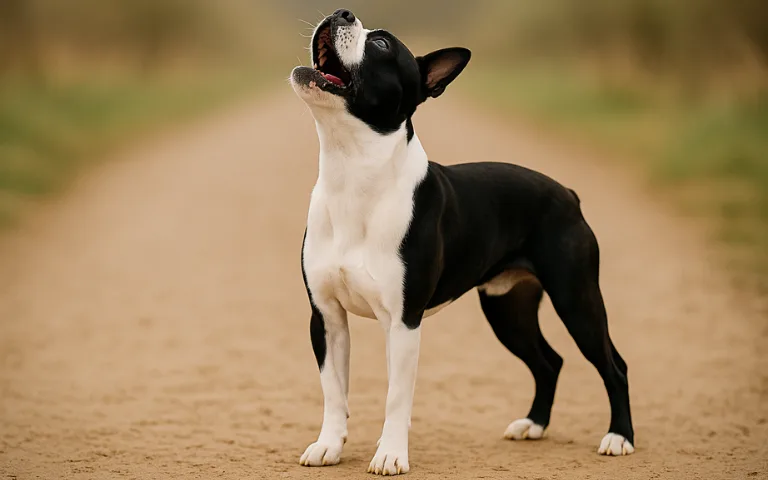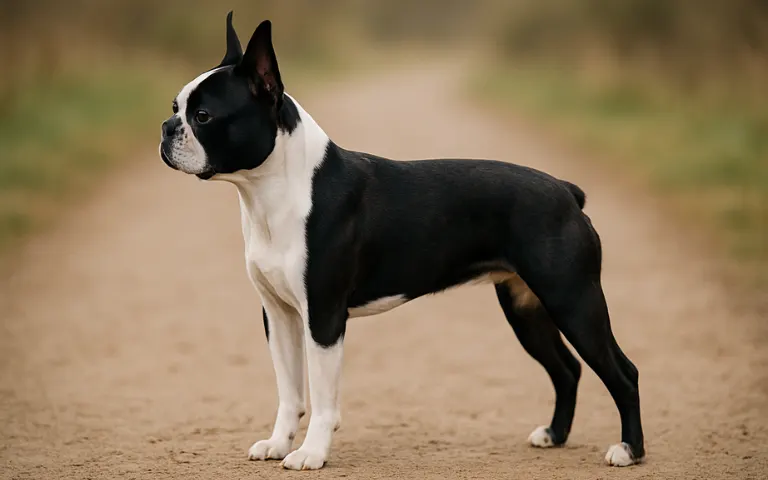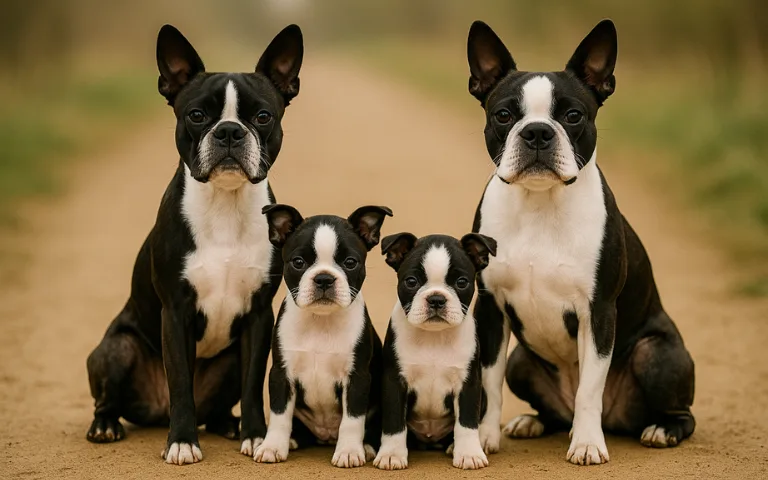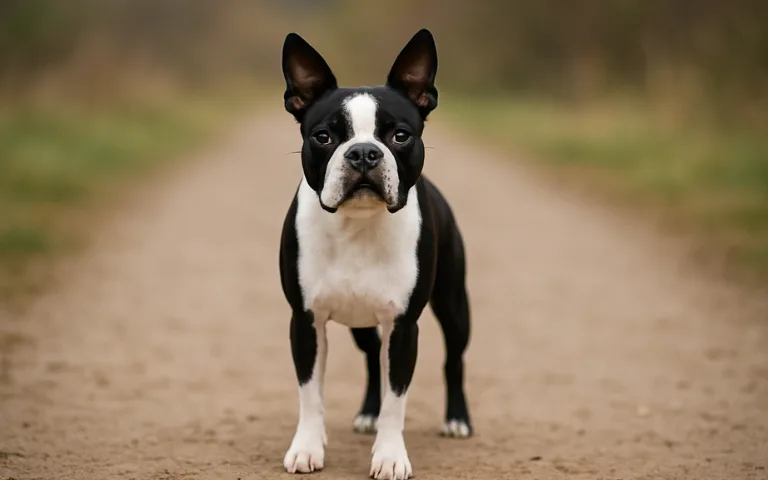The Boston Terrier, easily recognized by its dapper black-and-white coat and cheerful nature, is a compact yet sturdy breed cherished by dog lovers around the world. The American Gentleman is so called because, in addition to its appearance, it also possesses a happy and loving disposition.
Boston Terriers are excellent family dogs or spacious dogs that you can easily raise, whether you live in an apartment, a house, or a busy area of the city. Due to their adaptable nature and moderate exercise requirements, they easily adjust to any environment. You will have to keep a little eye on them. With a little love, affection, and a little training, you can make this dog the perfect companion.
They weigh between 12 and 25 pounds, and are about 15 to 17 inches tall. This breed can adapt to all kinds of people, such as a child, an intelligent teenager; they can be friends with everyone and are suitable for everyone. Because of their intelligence and “willingness to please,” they are fairly easy to train, even if you are a first-time dog owner.
Their low-maintenance coat, charming floppy ears, and emotive eyes add even more appeal. For individuals looking for a faithful, low-shedding buddy, Boston Terriers would be a good pick.
Still among the best dog breeds in the United States in 2025, not only for their looks but also for the warm relationships they develop with their humans.

Boston Terrier History
When it comes to the origins of the Boston Terrier, it’s a proud American story that dates back to the late 19th century. In Boston, Massachusetts, the breed was first developed as a cross between the White English Terrier (now extinct) and the English bulldog, thus creating a new breed.
This crossbreeding created a muscular, small dog with a square head and a docile demeanor that appealed to everyone. A very famous dog named Judge, who was born in the 1860s and played a major role in building the Dog breed, was one of the breed’s early ancestors.
Used for pit battling, Boston Terriers were once quite large and somewhat fierce. Their temperament has changed over time as a result of selective breeding; nevertheless, they are currently placid, obedient companion dogs. Due to their rising popularity, the Boston Terrier was officially recognized by the American Kennel Club (AKC) in 1893.
Particularly in cities, this dog had become rather well-known in America early in the 20th century. Their small size, easy maintenance, and nice demeanor made them suitable for both families and working professionals. Reflecting its cultural importance, the Dog was adopted as the official mascot of Boston University.
Today, the Boston Terrier is a loving and loyal family friend throughout the world as well as a representation of American quality. From a fighting dog to a gracious “American gentleman,” its past is a remarkable trip.
| Trait | Details |
| Breed Group | Non-Sporting (AKC) |
| Origin | United States (Boston, MA) |
| Weight | 12–25 pounds |
| Height | 15–17 inches |
| Life Span | 11–15 years (Avg: 11.8 years) |
| Temperament | Friendly, Intelligent, Lively |
| Coat | Short, smooth, tuxedo-pattern |
| Colors | Black & White, Brindle, Seal |
| Good With | Children, families, and other pets |
| Exercise Needs | Low to moderate (30 mins/day) |
| AKC Popularity | 24 (2022) |
Appearance and Physical Traits of the Dog
The Boston Terrier is a small, sturdy, and well-proportioned breed with a compact, square-shaped frame. It has a little tail and a sophisticated appearance that is immediately recognizable. Let’s examine each of its physical aspects:
Head
Boston Terriers have wrinkle-free, clean-cut, short, flat heads. Their face are symmetrical since their skulls are square.
Eyes
This Dog is known for its big, globe-like eyes that reflect a wide range of emotions. Set far apart, these eyes usually help the dog seem inquisitive and kind.
Ears
This Dog typically has ears that stand erect naturally, although cutting is still carried on in certain areas. Adding to their vigilant look are the little ears set at the edges of the skull.
Coat
The coat of this breed is short, smooth, and lies near to the body. Low-maintenance dogs will find it a good choice since it sheds very little and calls for relatively little grooming.
Color Variations
Though the black-and-white tuxedo look is iconic, The Dog is also available in brindle and seal, a rich brown hue that often appears black under specific lights. These patterns are marked and add to the dog’s sophisticated appearance.

Temperament and Personality
These dogs are celebrated for being playful companions with a warm and friendly heart. From subdued flats to busy homes, they create close ties with their families and adapt to various ways of life. Their main characteristics may be broken down as follows:
Alert but Not Aggressive
Boston Terriers are naturally alert and attentive, making them good watchdogs. However, they are not aggressive and typically greet strangers with curiosity rather than hostility.
Easy-going and Sociable
This breed is very social and easy to get along with. They enjoy being around people and other animals, and rarely show dominant or stubborn behavior when properly trained.
Loyal to Their Family
This Dog develops strong emotional connections with the people they love. They love being part of family activities and often follow their humans around the house with devotion.
Great with Kids and Seniors
Gentle and playful, Boston Terriers are excellent companions for children and older adults alike. Their calm demeanor and small build make Boston Terriers a great choice for families with kids and elderly individuals.
Ideal Therapy and Support Dogs
Thanks to their empathetic and intuitive behavior, many Boston Terriers make outstanding therapy or emotional support dogs. They can sense moods and often provide comfort during stress or anxiety.
Intelligence and Trainability
These dogs are highly intelligent and respond well to training, especially using positive reinforcement. They can learn commands quickly and love performing tricks.
Training Tips:
- Start from 8–10 weeks of age
- Use treats, praise, and short sessions
- Avoid punishment, they are sensitive
- Consider clicker training or agility sports
Grooming and Maintenance
This Dog is a low-shedding, low-maintenance breed, perfect for people who prefer a clean and simple grooming routine. Here’s a breakdown of their care needs:
Weekly Brushing
Their smooth, low-maintenance coat needs brushing only once a week to keep it looking good. This helps remove loose hair, distribute natural oils, and keep their coat looking shiny and healthy.
Monthly Bathing
Boston Terriers should be bathed every 4 to 6 weeks using a gentle, dog-safe shampoo. Overbathing can dry out their skin, so stick to a regular schedule unless they get unusually dirty.
Daily Face Fold Cleaning
Their cute little face folds can trap moisture and dirt. It’s important to wipe their facial folds daily with a damp cloth to prevent skin irritation and infections.
Nail Trimming Twice a Month
Boston Terriers’ nails grow quickly, and trimming them every two weeks helps prevent pain or injury during walking. If you hear their nails clicking on the floor, it’s time!
Eye Protection
Their big, prominent eyes can make Boston Terriers more likely to experience eye irritation. Ask your vet for approved eye drops or cleaning solutions to help protect them from dryness or debris.
Watch for Overheating
Because of their short snouts (brachycephalic structure), Boston Terriers can overheat easily in hot weather. Always monitor them during walks or play, especially in summer months.

Health and Lifespan of the Dog (2025 Updated)
Boston Terriers are generally healthy dogs, but like all breeds, they are prone to certain health issues. According to UK research in 2024, the Dog typically lives around 11.8 years. However, with good care, many enjoy longer lives. Let’s take a look at the most frequent health concerns:
Brachycephalic Syndrome
Due to their flat-faced structure, Boston Terriers can experience breathing difficulties, snoring, or intolerance to intense exercise. Avoid overexertion, especially in hot or humid weather.
Eye Conditions
Because of their large and exposed eyes, Boston Terriers are more prone to conditions such as dry eye, cataracts, and corneal ulcers. Regular cleaning and vet-recommended eye drops can help prevent infections and vision issues.
Skin Allergies
Boston Terriers may suffer from environmental or food-based skin allergies. Symptoms include itching, redness, or hair loss. A hypoallergenic diet and vet-guided treatment plan often helps.
High Rate of C-Section Births
About 80–90% of Boston Terrier litters are delivered via C-section, due to their narrow hips and large puppy heads. If you plan to breed, work closely with a vet for safety.
Extend Their Lifespan
To keep your Boston Terrier healthy and happy:
- Schedule regular vet checkups
- Maintain a balanced diet
- Prioritize dental care
- Keep them at a healthy weight
With proper love and care, your Boston Terrier can enjoy a long, joyful life by your side.
Is the Boston Terrier Good for Families?
Absolutely, among the finest family dogs I have ever known is the Boston Terrier. I would honestly say “Boston Terrier” if you asked me what breed suits virtually any house. Whether you live in a large house or a small apartment, this little guy fits right in.
Watching that Boston terrier play with her kids warms my heart, entertains me, yet also always feels soft. One of my dearest friends owns one. Although they enjoy chasing a ball, they won’t overwhelm small children with hyper energy.
How effectively they interact with elders, quiet, low-maintenance, and always by around like a loyal little shadow astonished me most. First-time dog owners are perfect. No continual barking, no drama; they nest like they always have. They don’t require a large garden; a little daily walk and cuddles on the couch will maintain their happiness.
From personal observation and experience, I would thus say the Boston terrier is a great family buddy, simple to adore and even simpler to live with.

Diet and Exercise Needs
Diet:
- High-protein, low-carb dog food
- Split meals: 2 per day
- Avoid table scraps or excessive treats
- Add omega-3 oils for coat & brain health
Exercise:
- 30 minutes of play or walk daily
- Mental games like puzzles or fetch
- Avoid overexertion in hot weather
| Category | Price Range |
| Puppy (Pet) | $800 – $1,500 |
| Puppy (Show) | $2,000 – $3,500+ |
| Monthly Costs | $70 – $120 |
| Insurance (optional) | $30 – $50/month |
Always buy from a reputable breeder or consider adoption from rescues.
Over Personal Experience
Really, among the cutest family canines I have ever come across are Boston Terriers. I’m saying this from what I’ve observed firsthand rather than only from what I have read. I was very startled by Milo, my cousin’s Boston Terrier’s friendly and quiet demeanor when I first visited their house. He softly came, saw my gaze, and sat by my feet as though he had known me for years; he neither barked nor acted lively.
Milo calls a modest apartment home and finds happiness in it. He spends the whole day playing inside or simply resting with the family; morning and evening walks are taken. Though never rough, he is very gentle with the children, humorous, and is always able to detect when someone is having a bad day. After a hectic day, I have seen him snuggle up to my aunt, who is in her 60s, quietly resting his head on her lap as though he understands everything.
Boston Terriers distinguish themselves by their emotional intelligence. Fast connectors, they easily adjust to new homes and don’t destroy like certain high-energy breeds. I really cannot recommend a better breed for families with children or senior members, as well as first-time dog owners. Apart from your life, they connect with you emotionally.
A Boston Terrier doesn’t feel like “just a pet,” it feels like a piece of your heart in fur form.
Final Verdict
Among the best companion dogs in 2025 is the Boston Terrier. If you are a single working person, a couple, or a member of a large family, this breed performs exactly as well. It has a quiet yet funny personality, creates close emotional bonds with its owners, and is low in maintenance.
They are among the best dog breeds now because of their amiable temperament and adaptability. If you want a dedicated, low-maintenance, and adorable friend animal, a Boston Terrier is a perfect option.
| Q1: Are Boston Terriers loud barkers? |
| Not really! These little charmers are quite peaceful. They usually bark only when they sense something unusual. |
| Q2: Can they stay home alone? |
| Yes, but not for too long. Boston Terriers love being around their people and may feel anxious if left alone for hours. |
| Q3: Are Boston Terriers hypoallergenic dogs? |
| Nope, they’re not officially hypoallergenic. But the good news? They hardly shed, which makes them a great option for people with mild allergies. |
